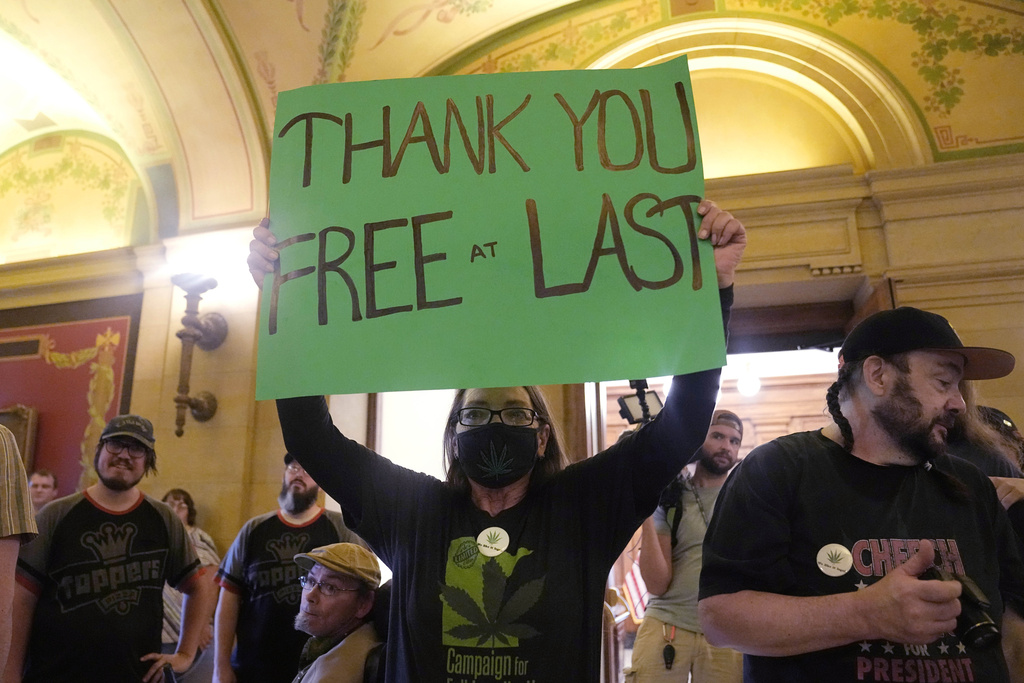
St. Paul begins to grapple with rules for cannabis retailers
St. Paul planning staff have proposed altering city zoning codes to regulate future cannabis retailers, prohibiting them within 300 feet of schools. Retailers spanning more than 15,000 square feet would be required to obtain a conditional use permit unless they’re in an industrial zone. Lower-potency, hemp-derived products could still be sold at bars and restaurants citywide.
The Union Park District Council and the Association for Nonsmokers-MN have called for more stringent rules, while individual retail owners have emphasized that the industry is growing and limiting their sales will simply force them to open shop in other cities.
Jeanne Weigum, president of the Association for Nonsmokers-MN, has urged the city to adopt a 1,000-foot separation requirement from schools and other sensitive uses — the maximum allowed by state law — and then loosen those distance requirements down the line, if desired. Getting stricter with time is unrealistic, she said.
“You can always go back and say, ‘Gee, we don’t have enough of these places’ … but once you have these businesses in place, it’s very difficult to get them out,” said Weigum, addressing the St. Paul Planning Commission on June 7. “Look at tobacco shops. … It’s easy to get it bigger. It’s very difficult to make the number smaller.”
When the state of Minnesota legalized the retail sales of cannabis last year, it left it up to individual cities to figure out the appropriate zoning. Should tobacco shops and other retailers selling adult-use cannabis products be limited to 300 feet, 500 feet or 1,000 feet from day cares, parks, schools and other sensitive uses? How about no separation requirement at all?
The state — which plans to license 13 different types of cannabis retail and manufacturing operations — has mandated that cities cannot prohibit cannabis retailers outright, but they can limit them to no less than one registration for every 12,500 residents, and up to 1,000 feet from schools and other particular types of neighbors.
After studying the experience of 29 cities that have already legalized sales, the St. Paul Planning Commission recently held a public hearing on its findings. The most prohibitive distance requirement possible — 1,000 feet — would leave about 63% of the city off-limits, concentrating cannabis retailers in just a handful of neighborhoods, most of them industrial areas like Energy Park Drive and some areas along Seventh Street. Sales would be prohibited from most major commercial corridors.
“You’re not going to attract any businesses here with the data that was just shown if you go with 1,000 feet,” said Anthony Wilson, a prospective cannabis retailer who grew up in St. Paul, during the recent public hearing.
A 300-foot requirement
City planning staff said they preferred a much looser standard — a 300-foot separation requirement from schools alone, enforced everywhere throughout the city except downtown, which would be exempt. That would leave about 10% of the city off-limits, otherwise opening up retail opportunities citywide.
To date, 178 St. Paul restaurants, bars and other sellers have registered to sell lower-potency, hemp-derived edible products. The city found three complaints against registered sellers, and sent customers under the age of 21 in as planted buyers. Two locations passed inspection and one failed, according to city staff. More complaints focused on non-registered sellers, according to city staff.
Additional proposed zoning rules would govern manufacture and cultivation of cannabis. Up to 15,000 square feet of indoor cultivation would be allowed on most commercial corridors. Over that size, growers would be limited to industrial areas. For outdoor cultivation — which is less likely in an urban area — a conditional use permit would be required, no matter the size of the plot.
Still other rules will govern cannabis testing facilities, product transport between two cannabis businesses, accessory uses such as breweries that produce cannabis drinks, and bike parking for cannabis retail. A zoning amendment on the horizon would govern cannabis cultivated for research within universities located in residential areas.
Another staff presentation to the Planning Commission is likely on July 19. Once approved by the Planning Commission, the proposed zoning changes would likely come before the City Council in August for implementation in September.
Related Articles
Swenson, Shah: The mental health of new dads needs attention, too
Top high school graduates for 2024
New president elected for Tri-State Conference of the NAACP
St. Paul family-run locksmith looks back on 100 years in business
Joe Soucheray: St. Thomas arena? It’s hard to pick a winner in this first-world problem
